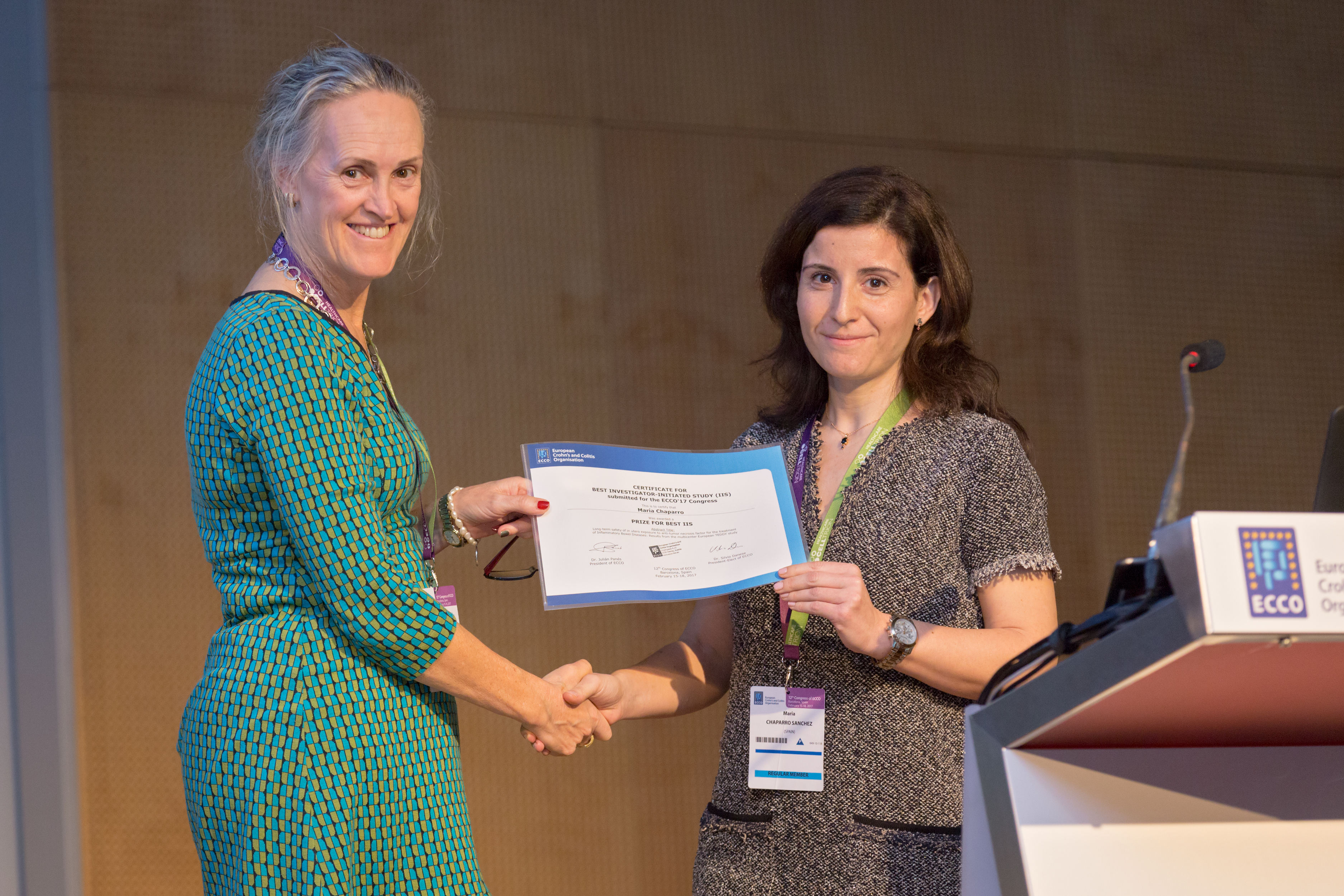Starting an investigator-initiated study with the help of ClinCom
Javier Gisbert, ClinCom Member
|
|
An interview with María Chaparro
Javier P. Gisbert: Investigator-initiated studies (IIS) are clinical studies initiated and managed by non-pharmaceutical company researchers, including individual investigators, institutions, collaborative study groups and cooperative groups. The researcher is responsible for the legal and regulatory responsibilities of the trial sponsor for the conduct and management of the study as defined by all applicable laws and regulations. Your group at La Princesa Hospital (Madrid, Spain) has remarkable experience in this type of study. What attracts you most to such studies?
María Chaparro: First of all, thank you for the opportunity to share my experience regarding a multicentre study supported by ClinCom. I believe that my experience with the TEDDY study may provide encouragement to all those researchers who have ever thought about launching a multicentre study within the ECCO Framework.
I think that the performance of clinical trials involving several countries can be challenging. However, it is worthwhile when you need to join forces in order to achieve a common goal in certain clinical scenarios, when the sharing of experiences among countries increases the robustness of the results.
Javier: The next question I would like to ask is, Why should you organise an international multicentre study and not be content with a purely national one, which would be much easier and cheaper to organise?
María: Sharing your experience with other researchers from different countries absolutely increases the impact of the research and the likelihood of changing disease management and improving patients' lives.
Javier: The ECCO Clinical Research Committee (ClinCom) aims to stimulate the development of high-quality IIS in Inflammatory Bowel Diseases (IBD) and to assist investigators in developing this type of study. Recently, you coordinated a large multicentre international study that was supported by ClinCom. Could you briefly describe the objectives and methodology of this study?
María: Treatment with anti-TNF therapies (mainly infliximab and adalimumab) during pregnancy in IBD patients seems to be safe for the mother and the foetus, at least in the short term. However, use of anti-TNF therapies during gestation is limited due to the scarcity of data on the impact of in utero exposure on the long-term development of children.
Therefore, we aimed to assess the influence of anti-TNF treatment on the long-term development of children born to IBD mothers exposed to these medications during pregnancy. Our main objective was to evaluate whether the risk of severe infection is higher in children exposed in utero to anti-TNF drugs.
To reach our goal, we designed a retrospective multicentre cohort study including children born to women diagnosed with IBD who had been treated with anti-TNF drugs during their pregnancy or within 3 months of conception. The study was supported by both GETECCU (Spanish Working Group on Crohn’s Disease and Ulcerative Colitis) and ECCO (ClinCom).
In order to identify the long-term effects of these drugs on offspring, a non-exposed cohort comprising children born to women with IBD who did not receive anti-TNF drugs during their pregnancies was also included. The principal variable was the risk of severe infections, defined as an infection that caused hospital admission of the child.
 María Chaparro at the 12th Congress of ECCO, Barcelona © ECCO María Chaparro at the 12th Congress of ECCO, Barcelona © ECCO |
Javier: For those who may be interested in requesting the collaboration of ClinCom in conducting an IIS, what are the steps that should be followed?
María: First you should submit a synopsis (max. four pages) of your study and a CV to ClinCom at This email address is being protected from spambots. You need JavaScript enabled to view it.. Then, ClinCom will review the synopsis and encourage, or decline, full protocol submission. An in-depth review process by ClinCom designed to optimise your study protocol will follow. (For further details on synopsis and full protocol templates, please refer to the SOPs on Submission of Clinical Study Protocols).
Javier: In your opinion, what can ClinCom’s contribution be when organising a multicentre international study?
María: ClinCom can help you in establishing a network and in performing a critical review of your studies to optimise study protocols and help avoid redundant or scientifically questionable research efforts. I would say that the main contribution of ClinCom to these projects is scientific review and dissemination. In this last respect, ClinCom offers to promote your reviewed study at the National Study Group meeting that takes place at the ECCO Congress in order to foster international collaboration, as well as to disseminate it through the ECCO National Representatives and the National Study Groups. In addition, information on the study will be included in eNewsletters to all ECCO Members. However, it is also important to emphasise that ECCO does not provide financial or logistical support to these studies.
Javier: And which do you think is the best type of study for an application for ClinCom collaboration?
María: First, and obviously, the study should be multicentre and executed predominantly in Europe (although it may not be restricted to Europe). Secondly, it should be proposed by an independent researcher; this means that the investigation must be independent of industry interests. Ideally, it should be a study with a simple and practical design, in which the great advantage of ClinCom involvement is the recruitment of a high number of patients. In this sense, ideally the study should be observational and non-interventional (either retrospective or prospective). Randomised clinical trials are not recommended as these studies generally require a highly complex design and involve many legal and logistic issues.
Javier: The international multicentre study that you have coordinated and that we mentioned previously has recently been published. Could you briefly summarise the most relevant results of this interesting study?
María: In total, 841 children from 51 referral centres in ten different countries were included, 388 (46%) of whom had been exposed to anti-TNF. Median follow-up after delivery was 47 months in the exposed group and 68 months in the non-exposed cohort. At both univariate and multivariate analysis, the incidence of severe infections was similar in non-exposed and exposed children [1.6% vs. 2.8% per person year, hazard ratio 1.2 (95% confidence interval 0.8–1.8)]. In the multivariate analysis, preterm delivery was the only variable associated with a higher risk of severe infection [hazard ratio 2.5 (1.5–4.3)].
In conclusion, this large multinational study found that exposure of IBD mothers to anti-TNF during pregnancy did not increase the risk of severe infection in offspring in the long term.
Javier: Finally, taking into account your personal experience, would you recommend asking ClinCom for advice when carrying out a multicentre international study?
María: Yes, for sure! ClinCom offers a great opportunity to perform a collaborative study within the ECCO Network. I strongly recommend proposing studies to ClinCom in order to boost the collaborative research among ECCO Members.
